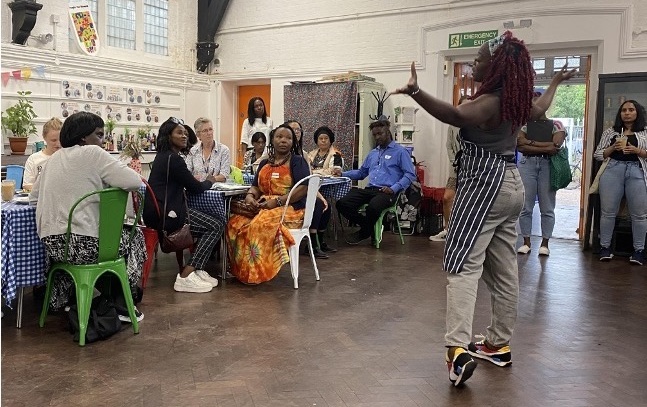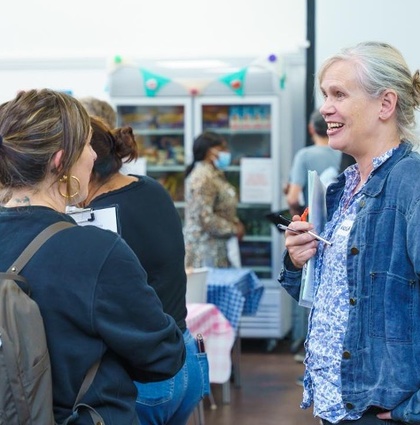

We Walworth is a new project to engage everyone in the neighbourhood about food and inequality in Walworth. With our partners we've been trying to learn in real time about our work. Here's what we learnt from our first months.
Social Life has been involved in the We Walworth project since the spring, working first with Pembroke House and Southwark Council and then with Small Axe and Koreo as they joined the team – as well as a growing number of people living in the area, and council and central government officers. It’s an ambitious idea – to build social capital around food and to change the way that people relate to central and local government. It has big aims, a complex partnership and is in Walworth, which has been Social Life’s home for the last decade. It takes place against a backdrop of extreme anxiety about costs and in an area where inequality colours many aspects of everyday life.
Social Life’s role is to be the learning partner, and to carry out research and evaluation, as well as part of the development and delivery of the project. The project partners have met nearly every week since May and have tried to be accountable to each other, to the aspirations of the project, and to the local community. We’ve been trying to learn in real time, gathering feedback from everyone after project meetings, through week notes and blogs and by reflecting back over what’s been achieved.
By September we had reached a point where plans were crystalising and we needed to start our most intensive phase of engagement - setting up a cohort of residents, local and central government staff to work on propositions to develop social capital through food. At several points in the summer we all felt that working so intensively in such a complex and ambiguous project was tough. However, by September some sort of clarity was emerging.
“There is a structure which considers and prioritises the engagement and wider community. It may not be perfect but it is something to work from and with which gives us space to adapt , this feels like movement towards the goal with direction and intention.” (project partner)
Collectively we drew a timeline of what had happened, where we had got to and what is planned.
We have tried to crystalise what have we have learned.
1 Relationships are central
Relationships between partners, between residents and partners, and between residents are the glue that will make the project succeed. From the earliest engagement we saw how important it was to leverage existing relationships if we wanted to attract people to events, and how digital signups can alienate many of the people we wanted to see in the room.
“The importance of some established ground and goodwill between folks cannot be underestimated when it comes to successful working together and this takes time to build up. I realise that this is part of the issue when the council seeks to engage with local people - why would people want to spend their precious time talking to us about things that are important to us? What’s in it for them?” (project partner)
2 We have needed more flexibility, adaptability and ability to deal with ambiguity than we expected
At many points in the summer plans pivoted sharply – dates for Neighbourhood Welcomes, the start date for cohorts, the naming of activities, and how we go about our in-depth engagement to draw on the energy of Walworth’s residents and communities. We were all preoccupied with internal matters and planning in the first few months.
“It should never be - ‘We have to do this, because we said we would do this!’ It has to always be ‘Is this still the right thing to do?’ and ‘Do we have the people to do it’? And if not, then what DO we have capacity to do.” (project partner)
We are all individuals with experience in different fields. Working together means finding a willingness to be challenged by people whose perspectives are different to ours.
“Its hard for us all - especially if close to our ways of working, but not an exact fit. But that's the point isn't it? A team of different approaches from different backgrounds all trying to find a common language/approach for this work together? We need to put ourselves out there too.” (project partner)
3 Issues of power are present and will not go away
From the first Neighbourhood Welcome onwards issues of relative power have been raised. Power comes into play between residents and professionals; between people carrying out engagement and people being interviewed; between researchers and people who are subjects of the research; between people who hold knowledge and people who don’t and between partners, particularly when some hold the budget and others don’t. Sometimes these tensions have been explicit, at other times they have retreated into the background.
Power discrepancies cannot be managed away as they reflect the wider world we operate within; they need to be acknowledged and actively taken into account in our relationships and ways of working.
“I had a really interesting conversation about positional power and sharing information and how to create a safe space. We will have to be really mindful of that when we start to create new cohorts of local people and think about use of language and how to help people get on board with the ideas and make them their own.” (project partner)
4 The early work of the project team is a prototype for the rest of the programme
Our cohorts – or groups of residents and officers working on a particular task - are likely to go through a similar process to the project team in its early months of defining goals, dealing with ambiguity and change, managing multiple interests and perspectives and finding ways of working that are right for Walworth. We need to learn from our early experience to inform the next stages of the work.
“How can we be inclusive and use ourselves as a guinea pig for the first cohort. What tools and spaces are needed to support the development of relationships between people to achieve something together when they may be faced with someone who has a completely different lived experience to their own?” (project partner)
5 Structures and tools matter
“Ways of working” have been highlighted since early meetings and we have put collective effort in project meetings into developing how we relate to each other and what tools and protocols we need. Issues about how we work across the partnership are constantly discussed, and many solutions have been tried - new platforms, meeting protocols, nw meeting structures, and different ways of communicating.
We have seen the limitations of digital platforms in reaching people outside institutions, and the need to think about the many community languages in the area. There have been frustrations with the amount of time taken to make decisions and how conversations were often repeated.
“If we want to build the new skills and capacity that we will need to work in a different way, the hard graft of ‘figuring it out’ must be undertaken by our team.” (project partner)
6 Building trust takes time
Changes in partners – arrival of new partners and individuals, and loss of particular individuals – is disruptive to relationships and becomes time consuming. Change means issues are revisited again and again. Turst has grown within the partners over time and the learning form shows that individuals feel more at home.
“It takes a long time to bring a new member into the group and we need to be conscious of this and protect the time for it!” (project partner)
7 Talking to Walworth
We Walworth has engaged with the area through conversations in the street, in Burgess Park, in shops and in the market. Each Neighbourhood Welcome has included training and practice sessions so everyone experiences directly the power of the experience of having conversations with people you do not know. Engaging through
conversations in everyday settings has proved to be energising and new for everyone - residents, council or government officers and project partners. We have become aware of our increased confidence in how we are engaging with Walworth.
“We're better at organising. People did the engagement better and more comfortably - only a few were at the last sessions so interesting what made it work better?” (project partner)
We Walworth is being evaluated against a theory of change that we developed before the partnership started work. At this time, almost a year ago, pressures on people and communities were high in the aftermath of COVID and in the face of the stark levels of inequality in Walworth. Now neighbourhood stressors have been intensified further by rising costs of food, housing and energy, and anxieties about everyday life over the coming months. We Walworth has been given money to work collaboratively and to find better ways of working to support communities. There are pressures on all of us to make sure that this money is not wasted at a time when public money is so scarce and needs are so high.
